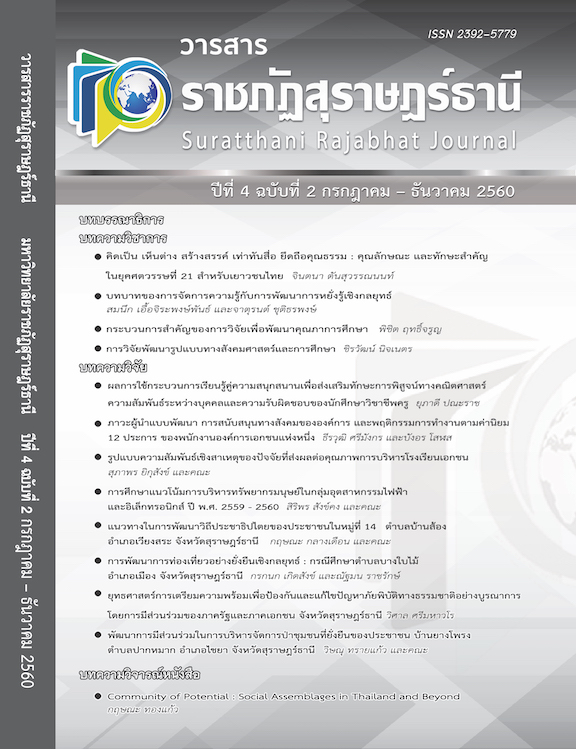Transformational Leadership, Social Support in Organization, and 12-Value Based Work Behavior of Employees in a Private Organization
Main Article Content
Abstract
This study aimed at examining the relationships among transformational leadership, social support in organization and work behavior following the 12 core values currently promoted by the government. The sample consisted of 340 employees in an organization located in Pathum Thani province. Data were collected by using 4 questionnaires to measure demographic information of the participants, transformational leadership, social support in organizations, and the 12-value based work behavior. The last 3 questionnaires possessed high reliabilities (α = .979, .948, .851, p < .05). Results from descriptive analysis indicated that the sample included 300 participants or 88 percent of those who received questionnaires, which consisted of almost equal numbers of males and females (51 and 49 percent, respectively), various adulthood ages, and most had 5 years or less work experience, held bachelor’s degrees, and were employed in operational positions. Results from inferential statistics found support for the hypotheses that transformational leadership as a whole and its factors were positively correlated with 12-value based work behavior (rs > .495, ps <.01), organizational social support in all and its aspects were positively correlated with the 12-value based work behaviors (rs > .615, ps <.01) and transformational leadership as a whole and its factors had positive relationships with organizational support (r > .537, p <.01). In addition, the study found 30.4 percent predictive power of transformational leadership and organizational social support on the 12-value based work behaviors. Suggestions could be made to the organization that improving transformation leadership and organizational social support would also increase the 12-value based work behaviors of employees. Further studies should research appropriate and effective methods for improving the leadership and social support.
Article Details
References
เตชทัต ใจท้วม. (2551). ความสัมพันธ์ระหว่างภาวะผู้นำแบบเปลี่ยนแปลงตามการรับรู้ของพนักงานกับการเสริมสร้างพลังอำนาจเชิงจิตวิทยาในงาน และความผูกพันในงานของพนักงาน. วิทยานิพนธ์ศิลปศาสตรมหาบัณฑิต สาขาจิตวิทยาอุตสาหกรรมและองค์การ มหาวิทยาลัยธรรมศาสตร์.
น้ำเพชร สุขเพ็ง. (2558). ความเกี่ยวข้องสัมพันธ์ระหว่างความมุ่งอนาคตควบคุมตน ความเชื่ออำนาจในตนและทัศนคติที่ดีต่อการทำงานกับพฤติกรรมการทำงานตามค่านิยม 12 ประการ ข้าราชการทหาร. กรุงเทพฯ : คณะพัฒนาทรัพยากรมนุษย์ สถาบันบัณฑิตพัฒนบริหารศาสตร์.
เปรมจิตร คล้ายเพ็ชร์. (2548). การสนับสนุนจากองค์การความยุติธรรมองค์การที่มีผลต่อความผูกพันต่อองค์การและความตั้งใจลาออก. วิทยานิพนธ์ศิลปศาสตรมหาบัณฑิต สาขาจิตวิทยาอุตสาหกรรมและองค์การ มหาวิทยาลัยธรรมศาสตร์.
พจนานุกรรม ฉบับราชบัณฑิตสถาน. (2554). พฤติกรรม (Online). สืบค้นได้จาก : http://www.royin.go.th/dictionary/. [2559, กันยายน 5].
พรรณิภา สืบสุข. (2548). ความสัมพันธ์ระหว่างการรับรู้ลักษณะงานและภาวะผู้นำการพัฒนา (Transformational Leadership) ของหัวหน้าหอผู้ป่วยกับความสุขในการทำงานของพยาบาล. วิทยานิพนธ์พยาบาลศาสตรมหาบัณฑิตสาขาการบริหารพยาบาล บัณฑิตวิทยาลัย จุฬาลงการณมหาวิทยาลัย.
สิทธิโชค วรานุสันติกุล. (2546). จิตวิทยาสังคม: ทฤษฎีและการประยุกต์. กรุงเทพฯ : ซีเอ็ดยูเคชั่น.
สิริอร วิชชาวุธ. (2549). จิตวิทยาอุตสาหกรรมและองค์การเบื้องต้น. กรุงเทพฯ : มหาวิทยาลัยธรรมศาสตร์.
AL-Hussami, M. A. (2008). Study of Nurses’ Job Satisfaction: The Relationship to Organizational Commitment, Perceived Organizational Support, Transactional Leadership, Transformational Leadership, and Level of Education. European of Science Research, 22.
Eisenberger, R., Armeli, S., Rexwinkel, B., Lynch, P. D., & Rhoades L. (2001). Reciprocation of Perceived Organizational Support. Journal of Applied Psychology, 86 : 42 - 51.
Eisenberger, R., Huntington, R., Hutchison, S., & Sowa, D. (1986). Perceived Organizational Support. Journal of Applied Psychology, 71, 500 - 507.
Morrison, R., Jones, L., & Fuller, B. (1997). The relationship between leadership style and empowerment on the job. The Journal of Nursing Administration, 27 (5), 27 - 34.
Muchinsky, P.M. (2003). Psychology Applied to Work (7th ed.). Wadsworth : Belmont.
Rhoades, L. & Eisenberger, R. (2002). Perceived Organizational Support: A Review of the Literature. Journal of Applied Psychology, 87(4), 698 - 714.
Shore, L. M., & Tetrick, L. E. (1991). A Construct Validity Study of the Survey of Perceived Organizational Support. Journal of Applied Psychology, 76, 637 – 643.
Walumbwa F. & Lawler J. J. (2005). Transformational Leadership, Organizational Commitment. Job Satisfaction: A Comparative Study of Kenya and U.S. Financial Firms, 15, 235 – 256.


